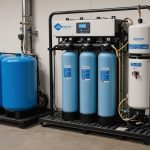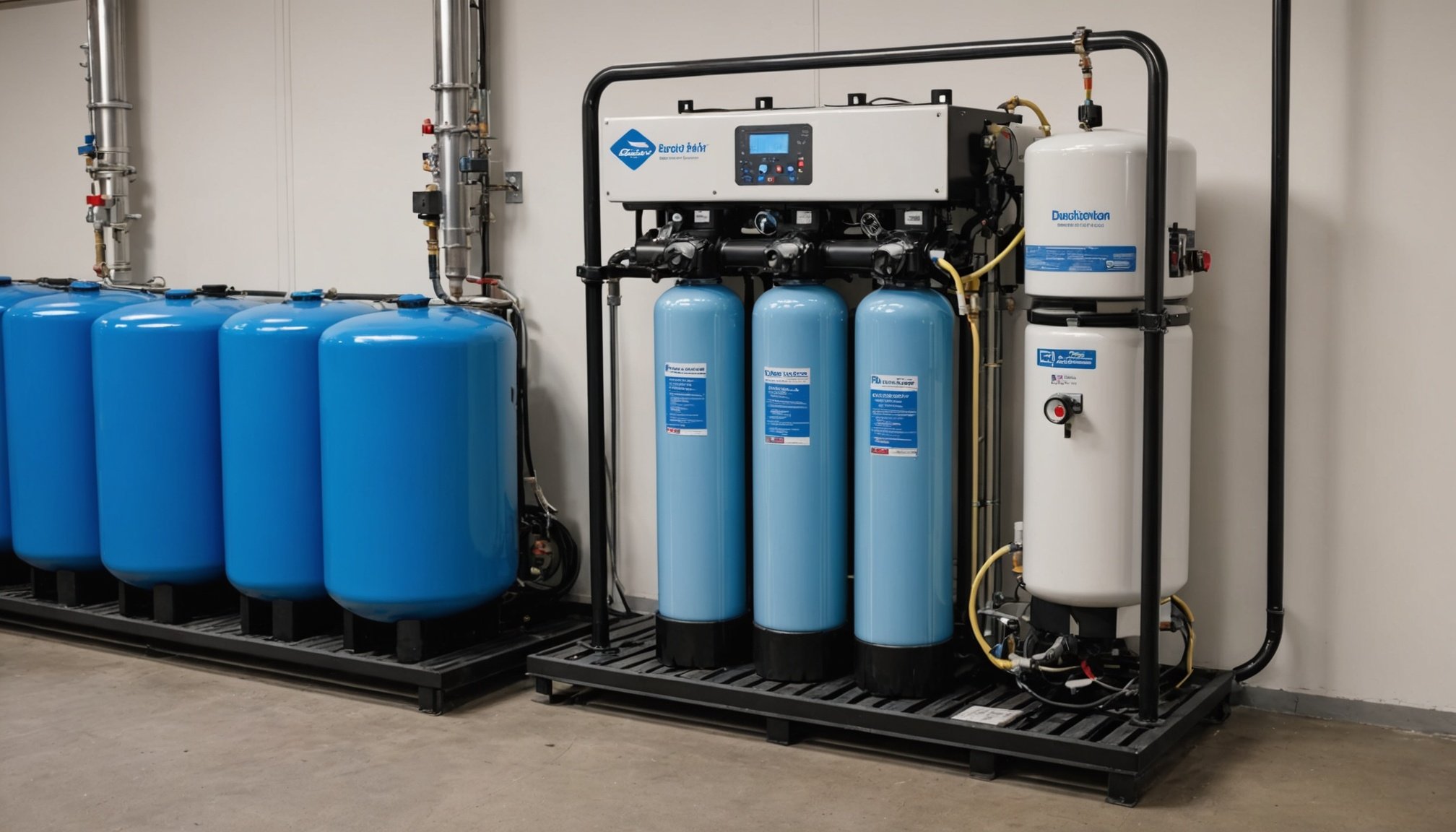Unlocking Pure Water: The Ultimate Guide to the Best Contaminant Removal Filtration Systems
In the quest for clean and safe drinking water, understanding the various filtration systems available is crucial. Whether you’re concerned about the quality of your tap water or looking to improve the taste and health benefits of your home water, this guide will help you navigate the world of water filtration.
Understanding Water Filtration
Water filtration is the process of removing contaminants from water to make it safe for human consumption and industrial use. This process is essential in ensuring that water meets health standards and is critical in various separation processes aimed at purifying and recycling water resources.
This might interest you : Top Foods to Eliminate for Easing Irritable Bowel Syndrome Symptoms
How Filtration Works
Filtration typically uses a physical barrier or filtration media, such as activated carbon, to trap contaminants. Here are some common types of filtration systems:
- Activated Carbon Filters: These filters are valuable for removing chemical impurities and improving the taste and odor of water. Activated carbon is particularly effective against volatile organic compounds (VOCs) and chlorine.
- Ion Exchange Filters: These systems replace ions in the water with ions on the resin to remove impurities like heavy metals and nitrates.
- Mechanical Filters: These filters use a physical barrier to remove particulate matter and sediment from the water.
Filtration vs Reverse Osmosis: What’s the Difference?
When deciding between filtration and reverse osmosis for your water purification needs, it’s important to understand the fundamental differences between these two approaches.
Also read : The Ultimate Guide to the Best Meditation Techniques for Effective Chronic Anxiety Relief
Filtration
Filtration uses physical barriers like activated carbon to remove impurities and is effective against specific contaminants. Here are some key points about filtration:
- Effectiveness: Filtration systems are generally effective against particulate matter, chlorine, and some chemical contaminants.
- Maintenance: Filtration systems typically require less maintenance compared to reverse osmosis systems.
- Cost: Filtration systems are often less expensive to purchase and maintain.
- Examples: The Purewell 3-Stage Gravity Water Filter System uses a composite filter technology to reduce most contaminants, including those as small as 0.01 microns.
Reverse Osmosis
Reverse osmosis employs a semi-permeable membrane for water treatment and is known for its comprehensive purification capabilities.
- Effectiveness: Reverse osmosis can remove up to 99% of contaminants, including dissolved chemicals, salts, organics, bacteria, and pyrogens, which cannot be filtered out by conventional filters.
- Maintenance: Reverse osmosis systems require more maintenance, including regular filter replacements and membrane cleaning.
- Cost: Reverse osmosis systems are generally more expensive to purchase and maintain.
- Examples: The reverse osmosis process involves a sequence of filtration steps, including sediment filtration, carbon filtration, semipermeable membrane filtration, and final activated-carbon filtration. This ensures a thorough removal of contaminants.
Key Components of Reverse Osmosis Systems
Reverse osmosis systems are highly effective due to their multi-step filtration process.
Steps in Reverse Osmosis
Here is a detailed look at the steps involved in a reverse osmosis system:
- Sediment Filtration: Removes larger particles and sediment from the water.
- Carbon Filtration: Reduces chlorine, taste, and odor.
- Semipermeable Membrane Filtration: Uses a membrane with pores around 0.0001 microns to block dissolved substances.
- Final Activated-Carbon Filtration: Polishes the water to improve taste and odor.
Osmotic Pressure: The Driving Force
Reverse osmosis works by applying external pressure to overcome the naturally occurring osmotic pressure. This forces the solvent (water) from an area of high solute concentration through the membrane to an area of low solute concentration, effectively purifying the water.
Comparing Performance: Filtration vs Reverse Osmosis
When comparing the performance of filtration and reverse osmosis, several factors come into play.
Contaminant Removal
| Type of System | Contaminants Removed |
|---|---|
| Filtration | Particulate matter, chlorine, some chemical contaminants |
| Reverse Osmosis | Dissolved chemicals, salts, organics, bacteria, pyrogens, heavy metals, asbestos |
Flow Rate and Water Waste
- Filtration: Generally has a higher flow rate and produces less water waste.
- Reverse Osmosis: Can have a lower flow rate and may produce more water waste if not using an efficient system. However, modern reverse osmosis systems are designed to be less wasteful.
Maintenance and Cost
| Type of System | Maintenance Needs | Cost |
|---|---|---|
| Filtration | Less frequent filter changes | Lower purchase and maintenance cost |
| Reverse Osmosis | More frequent filter changes | Higher purchase and maintenance cost |
Choosing the Right System for Your Home
Selecting the best filtration system for your home depends on several factors, including the quality of your tap water, your specific health concerns, and your budget.
Assessing Your Water Quality
Before choosing a filtration system, it’s essential to assess the quality of your tap water. Here are some steps you can take:
- Get a Water Test: Have your water tested for common contaminants like lead, heavy metals, and bacteria.
- Check Local Reports: Review local water quality reports to understand the common contaminants in your area.
Health Considerations
If you or a family member has specific health concerns, such as kidney issues or immune system deficiencies, a more comprehensive system like reverse osmosis might be necessary.
Budget and Maintenance
Consider your budget for both the initial purchase and ongoing maintenance. While reverse osmosis systems are more effective, they are also more expensive and require more maintenance.
Practical Insights and Actionable Advice
Here are some practical tips to help you make the most of your water filtration system:
Regular Maintenance
Regular maintenance is critical for both filtration and reverse osmosis systems. Here are some tips:
- Replace Filters: Replace filters according to the manufacturer’s instructions to ensure optimal performance.
- Clean the System: Regularly clean the system to prevent buildup and ensure water flow.
Choosing the Right Filter
When choosing a filter, consider the following:
- Activated Carbon Filters: Ideal for improving taste and odor and removing chemical impurities.
- Reverse Osmosis Systems: Best for comprehensive contaminant removal, especially for households with specific health concerns.
Examples of Effective Systems
- Alexapure Pro Ultimate Flow Kit: This system offers a comprehensive filtration solution with a high flow rate, making it suitable for home use.
- Purewell 3-Stage Gravity Water Filter System: This system uses a composite filter technology to reduce most contaminants, making it a good option for those looking for a gravity-fed system.
In the pursuit of clean and safe drinking water, understanding the differences between various filtration systems is key. Whether you opt for a simple filtration system or a more comprehensive reverse osmosis system, regular maintenance and the right choice based on your water quality needs are essential.
As Dr. Andrew Weil, a renowned health expert, once said, “The quality of water is a critical factor in maintaining health.” By choosing the right filtration system and maintaining it properly, you can ensure that the water in your home is clean, safe, and beneficial for your health.
Final Thoughts
When it comes to water purification, there is no one-size-fits-all solution. Here are some final thoughts to keep in mind:
- Water Quality Matters: The quality of your tap water should be your primary concern when choosing a filtration system.
- Health Benefits: Clean water is essential for health, and the right filtration system can significantly improve the quality of your drinking water.
- Maintenance is Key: Regular maintenance ensures that your filtration system continues to perform optimally.
By following this guide, you’ll be well-equipped to make an informed decision about the best filtration system for your home, ensuring that you and your family have access to clean, safe drinking water.











